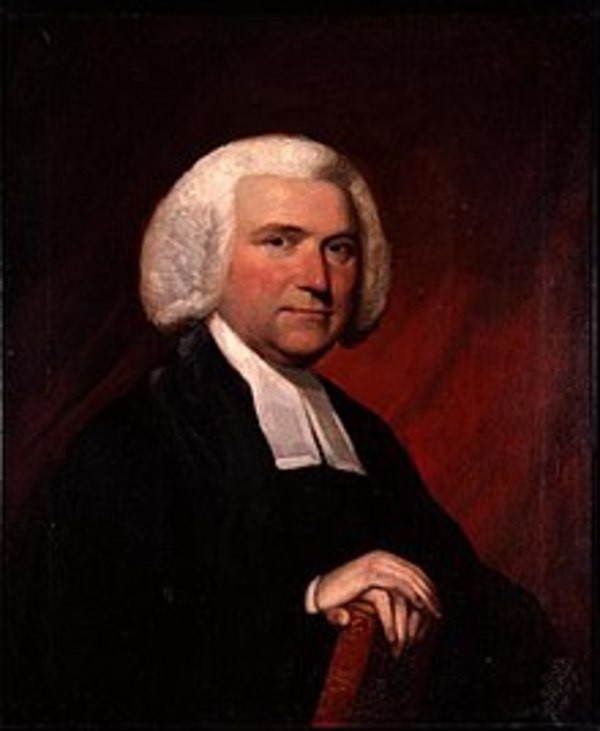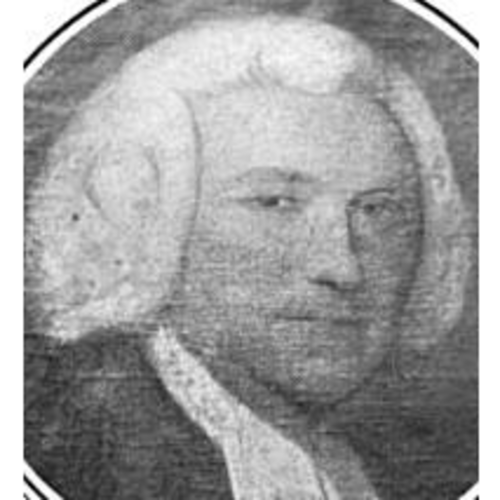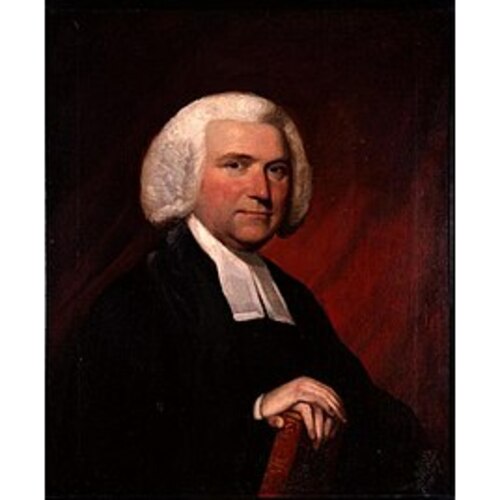
Source: Courtesy of Wikimedia Commons
BYLES, MATHER, Church of England clergyman and versifier; b. 12 Jan. 1734/35 in Boston, Mass., eldest son of the Reverend Mather Byles and Anna Gale, née Noyes; d. 12 March 1814 in Saint John, N.B.
Mather Byles came from a distinguished Puritan background. He was the great-grandson of the clergyman Increase Mather and a grandnephew of the colonial governor Jonathan Belcher; his father was a well-known tory Congregational minister, poet, and wit. A precocious boy, Byles entered Harvard College at the age of 12 and graduated in 1751. He was later to receive the degree of ma from Harvard in 1754 and from Yale College in 1757, and he obtained a dd from Oxford in 1770. Byles was happily married three times: to Rebecca Walter on 12 May 1761 in Roxbury (Boston); to Sarah Lyde on 10 Feb. 1777 in Halifax, N.S.; and on 2 Oct. 1788, also in Halifax, to Susanna Reid, née Lawlor, who proved a good mother to his 13 children by his first two unions. His descendants include a number of outstanding Nova Scotia families, one of his daughters having married William James Almon and two others a son and grandson of Thomas Desbrisay.
In 1757, after two years as librarian of Harvard College, Byles became a liberal Congregational minister in New London, Conn. In 1768 he was converted to the Church of England, went to England where he received a licence from the bishop of London, and then took up duties as minister of Christ Church, Boston, and missionary of the Society for the Propagation of the Gospel. After a stormy tenure with a Whiggish congregation, he resigned and would have taken up a position in Portsmouth, N.H., had the outbreak of hostilities not prevented him. In 1776 he fled with the British troops to Halifax, where he lived precariously as chaplain to the garrison and assistant to the rectors of St Paul’s Church. In May 1784 he went to England to press his claims for compensation as a loyalist. Awarded £120 and an annual pension of £100 in the form of “a perfect Sinecure,” the lifetime chaplaincy of the Halifax garrison, he returned to Halifax in May 1785.
In August 1788 Byles visited Saint John, N.B., and received a “Unanimous” call to become rector of Trinity Church. He moved there with his family in May 1789. At first the congregation met in temporary quarters, but on Christmas morning 1791 Byles conducted the first service in the newly built church that became the centre of loyalist, Anglican worship in Saint John. It was also supported by the Presbyterians, who had no minister, and thus was frequently overcrowded. Byles served with distinction until early 1814 when he went blind. He died on 12 March 1814 in the very chair in which his father and grandfather had died.
Byles was paternalistic and somewhat puritanical and cynical. He was not impressed by England, the Anglican episcopacy, or the whole “dissipated Age.” Unlike many loyalists he was not awed by aristocracy or royalty, refusing, for example, to act “like a Fool” by attending a dinner in Halifax for Prince William Henry. But like many loyalists he was not bitter towards the United States: “I wish my Country-Men Joy on the Attainment of their wishes.” He was erudite and a competent satirist. In Halifax he gave vent to his frustrations by ridiculing in verse many of the city’s leading citizens in a way, Governor John Parr* complained, “unbefitting a man of God.”
Byles was a cantankerous individual, quarrelling in Halifax with his fellow clerics, John Breynton*, Henry Caner, and Joshua Wingate Weeks, but remaining friendly with Bishop Charles Inglis. He did not like Nova Scotia, leaving “without the least Regret . . . the most contemptible [area] my Eyes ever beheld”: “I desire never to forget that the most irreligious People I ever knew were at the same Time the most ignorant, the most stupid, & the most unhappy.” In contrast, he was happy in New Brunswick partly because he liked his job. He reported to his famous loyalist sisters, Katherine and Mary, who continued to reside in Boston, that “it has pleased a good God to gild your Brother’s Evening Sky”: “I am connected with as worthy a People as I ever knew.”
A portrait of Mather Byles by his nephew Mather Brown, now in the possession of the American Antiquarian Society, Worcester, Mass., is reproduced in Shipton, infra.
PAC, MG 23, D6, 1: 21, 35, 41, 56, 58–59, 63, 66–67 (transcripts). A catalogue of all graduates in divinity, law, medicine, arts and music who have regularly proceeded or been created to the University of Oxford, between October 10, 1659, and December 31, 1850 . . . (Oxford, 1851). Shipton, Sibley’s Harvard graduates, 13: 6–26. A. C. Potter and C. K. Bolton, The librarians of Harvard College, 1667–1877 (Cambridge, Mass., 1897). A. W. H. Eaton, The famous Mather Byles: the noted Boston tory preacher, poet, and wit, 1707–1788 (Boston, 1914). [This book is about Byles’s father but contains much on the son. w.b.]
Cite This Article
Wallace Brown, “BYLES, MATHER,” in Dictionary of Canadian Biography, vol. 5, University of Toronto/Université Laval, 2003–, accessed December 17, 2025, https://www.biographi.ca/en/bio/byles_mather_5E.html.
The citation above shows the format for footnotes and endnotes according to the Chicago manual of style (16th edition). Information to be used in other citation formats:
| Permalink: | https://www.biographi.ca/en/bio/byles_mather_5E.html |
| Author of Article: | Wallace Brown |
| Title of Article: | BYLES, MATHER |
| Publication Name: | Dictionary of Canadian Biography, vol. 5 |
| Publisher: | University of Toronto/Université Laval |
| Year of publication: | 1983 |
| Year of revision: | 1983 |
| Access Date: | December 17, 2025 |




